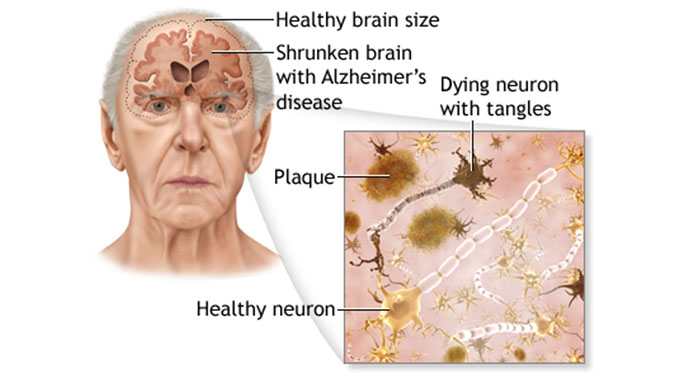
The ManicaPost

Dr Zuze Health Matters
Alzheimer’s disease is a progressive disease that destroys memory and other important mental functions. At first, someone with Alzheimer’s disease may notice mild confusion and difficulty remembering. Eventually, people with the disease may even forget important people in their lives and undergo dramatic personality changes.
Alzheimer’s disease is the most common cause of dementia — a group of brain disorders that cause the loss of intellectual and social skills. In Alzheimer’s disease, the brain cells degenerate and die, causing a steady decline in memory and mental function.
At first, increasing forgetfulness or mild confusion may be the only symptoms of Alzheimer’s disease that you notice. But over time, the disease robs you of more of your memory, especially recent memories. The rate at which symptoms worsen varies from person to person.
If you have Alzheimer’s, you may be the first to notice that you’re having unusual difficulty remembering things and organizing your thoughts. Or you may not recognize that anything is wrong, even when changes are noticeable to your family members, close friends or co-workers.
People with Alzheimer’s may:
◆ Repeat statements and questions over and over, not realizing that they’ve asked the question before
◆ Forget conversations, appointments or events, and not remember them later
◆ Routinely misplace possessions, often putting them in illogical locations
◆ Get lost in familiar places
◆ Eventually forget the names of family members and everyday objects
◆ Have trouble finding the right words to identify objects, express thoughts or take part in conversations
Alzheimer’s disease causes difficulty concentrating and thinking, especially about abstract concepts like numbers. Multi-tasking is especially difficult, and it may be challenging to manage finance and pay bills on time. These difficulties may progress to inability to recognise and deal with numbers.
Responding effectively to everyday problems, such as food burning on the stove or unexpected driving situations, becomes increasingly challenging.
Once-routine activities that require sequential steps, such as planning and cooking a meal or playing a favourite game, become a struggle as the disease progresses. Eventually, people with advanced Alzheimer’s may forget how to perform basic tasks such as dressing and bathing.
Brain changes that occur in Alzheimer’s disease can affect the way you act and how you feel. People with Alzheimer’s may experience depression, apathy, social withdrawal, mood swings, distrust in others, irritability and aggressiveness, changes in sleeping habits, wandering, loss of inhibition and delusions.
Many important skills are not lost until very late in the disease though. These include the ability to read, dance and sing, enjoy old music, engage in crafts and hobbies, tell stories, and reminisce.
Scientists believe that for most people, Alzheimer’s disease is caused by a combination of genetic, lifestyle and environmental factors that affect the brain over time.
Less than 5 percent of the time, Alzheimer’s is caused by specific genetic changes that virtually guarantee a person will develop the disease. Although the causes of Alzheimer’s aren’t yet fully understood, its effect on the brain is clear. Alzheimer’s disease damages and kills brain cells. A brain affected by Alzheimer’s disease has many fewer cells and many fewer connections among surviving cells than does a healthy brain.
Increasing age is the greatest known risk factor for Alzheimer’s. Alzheimer’s is not a part of normal aging, but your risk increases greatly after you reach age 65. The rate of dementia doubles every decade after age 60. People with rare genetic changes linked to early-onset Alzheimer’s begin experiencing symptoms as early as their 30s.
Your risk of developing Alzheimer’s appears to be somewhat higher if a first-degree relative — your parent or sibling — has the disease. Scientists have identified rare changes (mutations) in three genes that virtually guarantee a person who inherits them will develop Alzheimer’s.
Many people with Down syndrome develop Alzheimer’s disease. Signs and symptoms of Alzheimer’s tend to appear 10 to 20 years earlier in people with Down syndrome than they do for the general population.
Women seem to be more likely than are men to develop Alzheimer’s disease, in part because they live longer.
People who’ve had a severe head trauma also seem to have a greater risk of Alzheimer’s disease.
There’s no lifestyle factor that’s been definitively shown to reduce your risk of Alzheimer’s disease.
However, some evidence suggests that the same factors that put you at risk of heart disease also may increase the chance that you’ll develop Alzheimer’s. Examples include lack of exercise, obesity, smoking, high blood pressure, high cholesterol, poorly controlled diabetes and a diet lacking in fruit and vegetables.
If you are worried about Alzheimer’s disease please visit your doctor.



